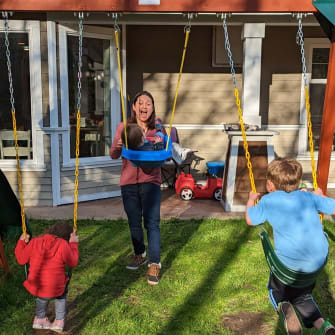
Mothers know best: Mary Bridge Children’s providers share unique perspectives as mothers and pediatric specialists
We and our children are ordinary people who have ordinary life challenges. – Dr. Andrea Donalty
Whether you’re a biological, foster, adoptive or bonus mom, or mother-like figure, you play an important role for the children in your life. In honor of Mother’s Day, we talked to several Mary Bridge Children’s providers who not only care for children every day at work, but also at home as mothers.
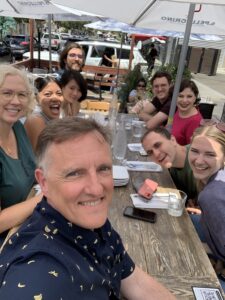
Dr. Bozich (far left) with her family
Thanks to Vanessa Tolbert, MD, pediatric hematologist/oncologist; Christine Bozich, MD, Mary Bridge Children’s urgent care family practice physician; Barbara Thompson, MD, pediatric endocrinologist and chief medical officer of Mary Bridge Children’s Health Network; Andrea Donalty, MD, primary care pediatrician; Stephanie Acierno, MD, pediatric surgeon; and Vanessa Carroll, MD, chief medical officer of Mary Bridge Children’s Hospital, for their contributions to this post.
How many children do you have?
Dr. Tolbert: Three — one boy and two girls. All 5 years old or under!
Dr. Bozich: Four adult children and three amazing daughters-in-law.
Dr. Thompson: One, my 11-year-old daughter.
Dr. Donalty: Four — ages 12, 14, 17 and 20.
Dr. Acierno: Two — an almost 16-year-old daughter and a 12-year-old son.
Dr. Carroll: Four, ages 14, 16, 18 and 21.
Does being a mother influence your medical practice as a pediatric specialist? How does it impact things like your bedside manner with your patients?
Dr. Acierno: It absolutely has influenced my practice — I had my daughter six weeks before starting my pediatric surgery fellowship. That really put me in a different position to look at how parents respond when their child is ill or needing surgery. It helped me better understand the challenges that parents — and my patients — may have in executing care plans and helped me offer suggestions and ideas to help overcome them.
I’ve been able to share my experiences with breastfeeding, potty training and experiencing a typical preschooler post-op course to help educate my patients’ families and reassure them that what they are experiencing is very normal. Now that my children are adolescents, I’ve been working hard on helping them get ready to be independent and responsible for themselves through graded responsibility. This has translated to me taking the same approach with my pre-teen and teen patients — helping them take graded responsibility for their health care.
Dr. Tolbert: Being a mother dramatically influences my practice and affects my recommendations and suggestions to my patients daily.
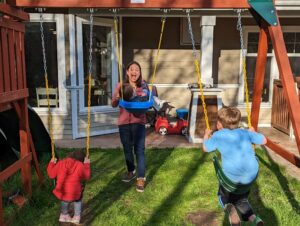
Dr. Tolbert playing outside with her children on their swing set
For example, I care for many toddlers with iron deficiency anemia. Before having children, I’d recommend iron-rich foods and prescribe ferrous sulfate liquid. Now, having picky toddlers of my own, I realize those recommendations are extremely difficult to do. I don’t prescribe ferrous sulfate anymore because I tasted it myself when trying to give it to my own child and it’s disgusting! Now, I discuss more palatable over-the-counter options that my children will actually take and discuss ways to help with picky eating. I’ve even recommended different social media accounts to follow for real-world ideas on how to get your child to eat more than mac and cheese — these aren’t things I learned in medical school, but things I’ve learned with trial and error in my own home.
Dr. Thompson: Absolutely. Often parents come in and feel judged for how their child is behaving at a visit. As parents, we know that one visit is only a snapshot, and we have all had less than picture perfect parenting moments.
What’s the most fulfilling part of being both a mother and a pediatric health care provider?
Dr. Bozich: As a mom and care provider, my role as physician allowed me to teach my children some core values for living: We will serve. We will work hard. We will share our strengths and abilities with others. I have a great relationship with all my children, and I get to bring that same energy into the care of other people’s children. It’s a blessing to get to partner with families in this way.
Dr. Tolbert: Getting to “do it all.” I get to help kids in my community — many who have very serious illnesses — while still getting to be there for my own children. I’m proud to show my own children how important it is to serve the most vulnerable people in our community. They understand when I’m paged at home by a family, that they need my help. And the families that call me are very understanding when they can hear my baby crying in the background. The shared humanity is humbling, and I feel lucky to be both a pediatric specialist and a mother in my community.
Dr. Donalty: Taking care of other families’ children is a great privilege. Showing our children the rewards of service to others is an equally great privilege.
Dr. Thompson: My daughter has come into the hospital with me to round and comes to diabetes camp. She doesn’t always love that I miss a lot due to working, but she has a deep sense of empathy.
How does being a mother help you relate to your patients and their families?
Dr. Donalty: We and our children are ordinary people who have ordinary life challenges. I recall a situation many years ago where a family was struggling with poor sleep habits with their toddler and when the mom finished telling me her concerns, she looked at me and said, “I’m sure it’s all perfect in your house.” In fact, it wasn’t perfect! I smiled and shared with her that just because I may know a few more tricks on how better sleep could be accomplished, it didn’t mean that it was actually being practiced successfully in my house.
Dr. Acierno: I know the challenges that we’re facing to raise both physically and emotionally strong children these days — the internet, social media, school funding issues, the social isolation that resulted during COVID are only a few. Our kids have more issues with anxiety and depression than ever before.
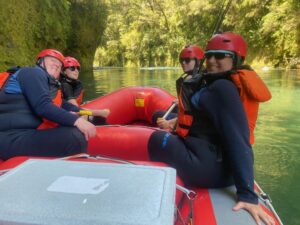
Dr. Acierno (far right) river rafting with her family
Advocating for our children has become more and more important and helping them find resources to find out what they’re passionate about is incredibly important. We’ve designed our clinic to make it a little easier for families to navigate the perioperative process so that it’s one less stress they have to worry about.
Dr. Bozich: When you have children of your own, you understand how challenging it is to be a parent. You’re not perfect, and sometimes you respond or react inappropriately out of worry. When stressful situations like health care crises occur, a parent isn’t always thinking clearly. I remind myself and my colleagues that when we’re working with families, it’s not just the child who may be scared or in pain — sometimes it’s the parents who are really struggling and fearful. We need to give families lots of grace in these high-stress situations.
Dr. Carroll: While you don’t have to be a parent to be an incredible pediatrician, being a parent reminds me of the importance of what I do daily. Children are truly amazing and represent our future. They often demonstrate the best in each of us. My children ask tough questions and help me to think differently and see things from other perspectives. While parents teach their children a great deal throughout life, children can be some of our best teachers.
As a pediatric health care provider, is there anything you “never let your kids do” as far as it comes to their health and safety?
Dr. Thompson: Not using the appropriate car seat or not wearing a seat belt. They absolutely save lives.
Dr. Bozich: When my older children were younger, we focused on not talking with strangers and not getting in an unknown car. With my younger children, we had to navigate new territory with social media and internet usage — don’t connect with people you don’t know, don’t share personal information with strangers. My children also knew we wouldn’t own a trampoline — mommy saw too many injuries to want one of those in her own home.
Dr. Acierno: Since they were little, we’ve always stressed the importance of wearing seat belts appropriately and wearing a helmet when riding their bikes or their skateboards. They know that they can “never” ride a bike without a helmet. As a pediatric surgeon we cover pediatric trauma — protecting your brain is protecting who you are — we can surgically fix a lot of things, but for brain injuries we can only prevent further injury while the brain heals itself.
Dr. Donalty: Before having children, there were lots of “I’d nevers” … then the kids came around and suddenly we found ourselves “nevering” like never before!
Mother-to-mother, what would you tell your patients’ moms?
Dr. Carroll: Give yourself a break. As parents, we’re all trying our best. Social media has done a wonderful job of bringing us together, but at times, it feels as if the bar has been raised higher than in years past.

Dr. Carroll (third from right) with her family at Glacier National Park
It can be challenging, and even overwhelming, to juggle all our responsibilities. We need to support one another and limit our judgment.
Dr. Tolbert: You’re doing a great job. No parent is perfect, but if you care and you try, you are being a good parent. Your child is lucky to have you.
Dr. Donalty: I tell my patient families this all the time: You will make mistakes and say or do things that later you decide you should’ve said or done differently. Kids don’t come with instruction books. You learn right alongside your child and model what forgiveness, acknowledging mistakes, apologizing, learning and growing from your missteps looks like. Recognize that we’re in this together.
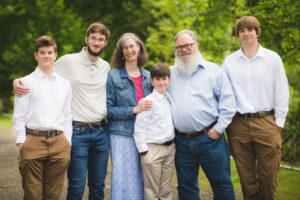
Dr. Donalty (third from left) with her family
Our goals are likely the same as yours — ensuring the healthy development of your child — but we are fallible humans with feelings and families as well. Respecting time and boundaries on both sides is important.
Dr. Bozich: Treat your children as you would like to be treated and don’t expect things from them that you wouldn’t expect of yourself.
Dr. Acierno: Keep the doors of communication open with your kids — give them an opportunity to find their passions and help them develop them. If they know they can talk to you open and honestly, you’ll give them the chance to flourish and know you’ll have their back. Do new things together as a family, spend time outdoors as much as you can — the Pacific Northwest is a beautiful place, take advantage of it.
Navigating challenges on Mother’s Day can be especially difficult for those with strained relationships, or those dealing with grief and loss. What would you like to say to those people?
Dr. Thompson: It’s OK to grieve those we have lost or the relationships we didn’t have. The love and support that we celebrate today does not need to be defined by biological ties.
Dr. Donalty: Acknowledge the struggles and that all those feelings are OK. Consider whether there is a mother somewhere — even if outside of your family — to celebrate and for whom to be thankful.
Dr. Carroll: You’re not alone. These joyous days for some can be exceptionally difficult for others. Be kind to yourself and allow for the wave of emotions. Know you’re loved.
Mary Bridge Children’s provides child-centered and family-first care, with providers and staff who are committed to treating their patients as if they were their own children. To find a provider near you, visit our Find a Doctor page.